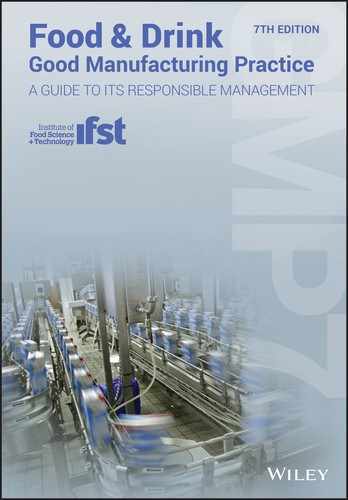40
SUSTAINABILITY ISSUES
Principle
In the Introduction, the intention was made clear to limit this Guide to matters having a direct bearing on the scientific, technological and organisational aspects affecting the quality, legality and safety of products. For this reason, detailed consideration has not been given to sustainability as an issue, but supply chain requirements for the manufacturer to demonstrate that they are sustainable have an impact on the factory and its operations.
General
40.1 For many manufacturing businesses it is a prerequisite to supply that they can demonstrate that they have a business sustainability plan in place. This often forms part of an overall corporate social responsibility (CSR) strategy. CSR considers the role that organisations play in how they act and react to stakeholder concerns over environmental and social issues. Whilst the bottom line is often used as a term to describe profitability, sustainability considers three elements: economic sustainability, environmental sustainability and social sustainability, the ‘triple bottom line’. Personnel, responsibilities and training (Chapter 17), worker welfare standards (Chapter 18), waste management (Chapter 30), food donation controls and animal food supply (Chapter 31) and environmental issues (Chapter 41) are considered in this Guide and demonstrate some of the elements of good manufacturing practice that influence organisational sustainability.
40.2 Extrinsic product characteristics such as animal welfare standards, social standards or environmental standards are often used to communicate to consumers the way that ingredients or manufactured products have been grown, so‐called business‐to‐consumer (B2C) standards, for example Fairtrade and organic standards. Certification to these standards can result in logos being placed on product packaging to communicate directly to consumers. It is important that provenance is maintained during all manufacturing processes so integrity can be demonstrated (Chapter 15), especially in the event of reworked product (see Chapter 29). Certification to third‐party standards is also a way for manufacturing organisations to demonstrate their sustainability credentials to their customers through business‐to‐business (B2B) standards. These standards include worker welfare standards (see Chapter 18), SA8000, the social accountability standard, and ISO 26000 guidance on social responsibility. ISO 26000 provides guidance on how organisations can operate ethically, contributing to sustainable development whilst also taking into account legislative requirements, stakeholder expectations and accepted business behaviour. The ISEAL Alliance1 has a range of information on sustainable sourcing standards.
40.3 CSR performance is often measured through the development of key performance indicators or metrics. Corporate social performance, sustainability indexes and social responsibility disclosure frameworks such as the Global Reporting Initiative encourage more companies to undertake sustainability disclosure. As outlined in 40.2 disclosure can be either B2B or B2C and the extent to which indexes such as the Dow Jones Sustainability Index and FTSE4Good are used is growing.
